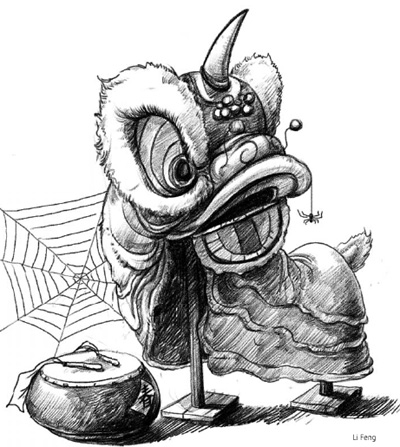National identity depends on culture, too

My favorite time of the year starts this week, but I am not excited for the obvious reasons. It is not my favorite time because I can drink more, go out more, eat more and work less. Those are welcome diversions from the daily humdrum, but my joy throughout lunar new year festivities is in the outpouring of Chinese traditional revelry and culture that's not possible to experience so fully during the rest of the year.
I live in a small obscure city in Sichuan province - where people are more conservative and rooted in tradition than in cosmopolitan cities in the eastern coast. But even here, many times it feels as if we're on an unstoppable march toward a kind of soulless modernity. If you look at the townscape or people's clothes, you could be anywhere in the world.
Imagine my surprise then, during my first new year here, when I discovered that there is a large Buddhist temple on the outskirts of the city. I had never imagined that the city's residents had even an iota of piousness. But that day I saw the unimaginable: The entire city had descended on the temple, its massive courtyards heaving with people, everyone making offerings of paper money and joss sticks and then circumambulating a large stupa. Outside the temple, bursting firecrackers chased me like devils.
It is such manifestations of traditional culture during Spring Festival season that I admire. Further meaning is added at homes, eating from an array of dishes that include pig's head and pig's buttocks - to signify the beginning and the end of the year - as well as wandering the streets and joining people bursting fireworks and paper lanterns.
I suppose I am lucky to be living in a small city, because in China's more modern cities, lunar new year as well as other traditional celebrations are dimming out under the creeping imported scraps of foreign globalized culture. In cities that claim to be more modern, Christmas and New Year's Eve celebrations have as much visibility as Spring Festival.
Mind you, there is nothing wrong with cultural cross-pollination or with different people adopting the feasts of others. For example, Chinese new year is now celebrated in most countries in the world and has become a standard fixture in their events calendar. Likewise, Western festivals such as Christmas, New Year and Valentine's Day are now celebrated in China. This is all good. But China should be careful that its own cultural traditions are not lost in its transition to modernity and the adoption of foreign festivities.

Much culture is being eroded in China. Aside from new year, almost all the other cultural events have almost lost their visibility. All that remains of many traditional festivals is some special dishes that a few people still eat. Even some of the manifestations of lunar new year are dying out. This is a pitiful loss. For example, despite spending some years in China, I have never seen a lion or dragon dance. These dances used to happen during the new year. Young men used to organize such dances in every village. But today you would have to go to remote villages to see one.
No lion or dragon dance is held even in the small city where I live. My family and friends say young people are no longer interested in performing lion dances, and the pocket money they can make would be too small by today's standards. Youths now prefer to stay glued to their computers, and as a result, the lion (and dragon) dance is being lost as a folk art form and cultural expression. It's a pity that the only lion or dragon dances I have seen have been among Chinese communities in Southeast Asian or European countries.
Cultural expressions are being eroded because of a variety of reasons. It's a sign of society becoming more individualistic, devoid of community bondage or sense of belonging, and the new generations seeking flashier and immediate gratifications in life.
Yet traditions and manifestations are important because they give meaning to a society's cultural history and way of seeing. Culture is identity, and retaining a distinct sense of one's identity means that individuals retain a sense of civic belonging and responsibility, a sense of pride in one's society, and ultimately a sense of confidence about the society he or she belongs to.
I am not saying that China is losing its identity. China retains a strong sense of identity in its language, food, and other ways of seeing and doing things. But cultural manifestations are indeed one aspect of history that is dimming in China, and that means considerable loss of drama and art forms.
Society's priorities are changing, and hence keeping cultural events alive in dramatic glory requires the efforts of dedicated groups of individuals or government departments. It requires finding innovative ways of continuing to express traditional events and festivities - by innovative I also mean the ability of organizers to attract an audience, especially the new generation that is distracted by the Internet.
Local tourism or governments' cultural departments have a role to play in the festivities in most of China's cities during Spring Festival. Many people organize pyrotechnic shows during the Lantern Festival. Other events can be organized to celebrate festivals during the year. They could also work to raise awareness of the beauty and importance of traditional cultural manifestations so that people continue to express different aspects of traditional art forms in a manner that fits the changing priorities and tastes brought on by modernization.
The author is a freelancer from Malta.
(China Daily 02/09/2010 page9)














